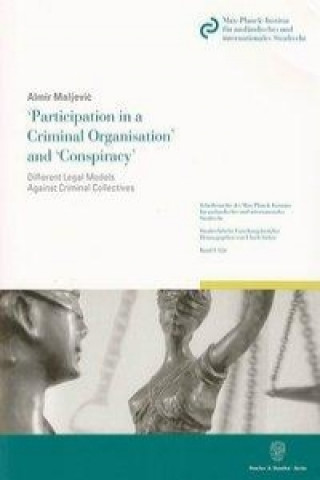
Kod: 12720873
'Participation in a Criminal Organisation' and 'Conspiracy'
Autor Almir Maljevic
The extension of criminalisation to include the early preparatory stages of the commission of criminal offences represents one of the most debatable issues in modern criminal law. In response to some of the most complex forms of c ... więcej
- Język:
 Angielski
Angielski - Oprawa: Miękka
- ISBN-13: 9783861138396
Wydawca: Duncker & Humblot GmbH, 2011
- Więcej informacji o książce

Zobacz książki o podobnej tematyce
-

Dune
34.67 zł -33 % -

Haunting Adeline
125.19 zł -1 % -

Berserk Deluxe Volume 2
211.60 zł -1 % -

White Nights
15.23 zł -23 % -

Powerless
48.51 zł -11 % -

Atomic Habits
57.23 zł -28 % -

Dune Messiah
46.10 zł -3 % -

Berserk Deluxe Volume 3
217.11 zł -3 % -

One Day
32.47 zł -36 % -

Berserk Deluxe Volume 1
210.79 zł -2 % -

Iron Flame
60.84 zł -28 % -

Surrounded by Idiots
36.58 zł -28 % -

Harry Potter and the Prisoner of Azkaban (Minalima Edition)
169.60 zł -2 % -

Gravity Falls Journal 3
89 zł -

Heaven Official's Blessing: Tian Guan Ci Fu (Novel) Vol. 1
59.73 zł -33 % -

The Creative Act
99.73 zł -15 % -

Dune
47.10 zł -23 % -

Hunting Adeline
125.89 zł -4 % -

A Little Life
46.80 zł -14 % -

Children of Dune
46.50 zł -2 % -

Heaven Official's Blessing: Tian Guan Ci Fu (Novel) Vol. 2
77.37 zł -14 %
Powiadomienie o dostępności
Wpisz swój adres e-mail, aby otrzymać od nas powiadomienie,
gdy książka będzie dostępna. Proste, prawda?
Więcej informacji o 'Participation in a Criminal Organisation' and 'Conspiracy'
 Opis
Opis
The extension of criminalisation to include the early preparatory stages of the commission of criminal offences represents one of the most debatable issues in modern criminal law. In response to some of the most complex forms of crime usually committed by criminal collectives (such as terrorism, organised crime, or economic crime), different legal systems have developed diverse legal models to address the problem. All in all there are two main models. Countries of the continental criminal law tradition usually rely on the 'participation in a criminal organisation/association' model, whereas countries of the common law tradition utilise the 'conspiracy' model. These models, although having similar functions (to criminalise the early preparatory stages of the commission of criminal offences), are very different in their constitutive elements. This book, for the very first time, explains the differences between the two types of models and points out the process of transfer of their elements from traditional models (Germany and England and Wales) to the international models (UN and EU), and furthermore to transitional models (Bosnia and Herzegovina, Croatia, and Serbia). The author is of the opinion that the differences between the two types of models are such that they cannot be seen as viable alternatives in criminal law, as suggested by the international models. He therefore suggests that the fight against criminal collectives requires cumulative criminalisation using both models in order to be effective.
 Szczegóły książki
Szczegóły książki
- Pełny tytuł: 'Participation in a Criminal Organisation' and 'Conspiracy'
- Podtytuł: Different Legal Models Against Criminal Collectives
- Autor: Almir Maljevic
- Język:
 Angielski
Angielski - Oprawa: Miękka
- EAN: 9783861138396
- ISBN: 3861138395
- ID: 12720873
- Wydawca: Duncker & Humblot GmbH
- Waga: 451 g
- Wymiary: 225 × 154 × 19 mm
- Data wydania: February 2011
zadowolonych klientów
Od roku 2008 obsłużyliśmy wielu miłośników książek, ale dla nas każdy był tym wyjątkowym.
Copyright! ©2008-24 libristo.pl Wszelkie prawa zastrzeżonePrywatnieCookies



 21 milionów książek
21 milionów książek Dostawa 10.99 zł
Dostawa 10.99 zł (32) 444 93 66 (8-15.30h)
(32) 444 93 66 (8-15.30h)